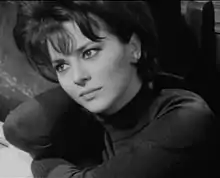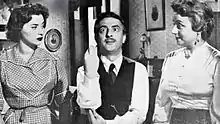Giovanna Ralli
Giovanna Ralli, Commendatore OMRI, Grande Ufficiale OMRI (born 3 January 1935), is an Italian stage, film and television actress.[1]
Giovanna Ralli | |
|---|---|
 Giovanna Ralli in La vita agra (1964) | |
| Born | 3 January 1935 Rome, Italy |
| Nationality | Italian |
| Occupation | Actress |
| Years active | 1942–2014 |
| Spouse |
Ettore Boschi
(m. 1977; died 2013) |
Life and career
Born in Rome, Ralli debuted as a child actress at 7; at 13 she made her theatrical debut, entering the stage company of Peppino De Filippo.[2] After appearing in Federico Fellini and Alberto Lattuada's Variety Lights (1950), Ralli had her first film roles of weight in mid-fifties, often in comedy films.[3] In 1959 she had a leading role in Roberto Rossellini's General Della Rovere, that won the Golden Lion at the Venice Film Festival, while in 1960 her performance in Escape by Night, also directed by Rossellini, was awarded with the Golden Gate Award for Best Actress at the San Francisco International Film Festival.[4]
Ralli later won a Nastro d'Argento award, as best actress, for La fuga (1964).[5] In the mid-sixties she had a brief Hollywood career, starting from Blake Edwards' What Did You Do in the War, Daddy?.[6] In 1974 she won her second Nastro d'Argento, as best supporting actress, for We All Loved Each Other So Much.[5] Starting from early eighties, Ralli focused her activities on stage.[2] In 1993 she received a Flaiano Prize for her career.[3] In 2003 she was made a Grand Officer of the Italian Republic.[7] At the 2015 Taormina Film Fest, where she received a special award for her career, Ralli announced her retirement from acting.[8] She considers herself Roman Catholic.[9]
Filmography



- The Children Are Watching Us (1942, by Vittorio De Sica) – Una bambina
- The Passaguai Family by Aldo Fabrizi (1950)
- Variety Lights by Alberto Lattuada and Federico Fellini (1950)
- The Passaguai Family Gets Rich by Aldo Fabrizi (1952)
- La lupa by Alberto Lattuada (1953)
- Rivalry by Giuliano Biagetti (1953)
- It Happened in the Park by Gianni Franciolini (1953)
- Easy Years by Luigi Zampa (1953)
- The Ship of Condemned Women by Raffaello Matarazzo (1953)
- Le signorine dello 04 by Gianni Franciolini (1954)
- Madame du Barry by Christian-Jacque (1954)
- The Three Thieves by Lionello De Felice (1954)
- Roman Tales by Gianni Franciolini (1955)
- Le ragazze di San Frediano by Valerio Zurlini (1955)
- Les Hussards by Alex Joffé (1955)
- A Hero of Our Times by Mario Monicelli (1955)
- The Bigamist by Luciano Emmer (1956)
- Peccato di castità by Gianni Franciolini (1956)
- The Most Wonderful Moment by Luciano Emmer (1957)
- Nel blu dipinto di blu by Piero Tellini (1959)
- Move and I'll Shoot by Mario Mattoli (1958)
- The Defeated Victor by Paolo Heusch (1958)
- Tuppe tuppe, Marescià! by Carlo Ludovico Bragaglia (1958)
- My Wife's Enemy by Gianni Puccini (1959)
- The Thieves by Lucio Fulci (1959)
- General Della Rovere by Roberto Rossellini (1959)
- Wild Cats on the Beach by Vittorio Sala (1959)
- Escape by Night by Roberto Rossellini (1960)
- Warriors Five by Leopoldo Savona (1960)
- Carmen di Trastevere by Carmine Gallone (1962)
- La monaca di Monza by Carmine Gallone (1962)
- Let's Talk About Women by Ettore Scola (1964)
- La vita agra by Carlo Lizzani (1964)
- La fuga by Paolo Spinola (1964)
- What Did You Do in the War, Daddy? by Blake Edwards (1966)
- The Caper of the Golden Bulls by Russell Rouse (1967)
- The Mercenary by Sergio Corbucci (1968)
- Deadfall by Bryan Forbes (1968)
- The Invisible Woman (1969, by Paolo Spinola) – Laura
- Cannon for Cordoba (1970, by Paul Wendkos) – Leonora
- Una prostituta al servizio del pubblico e in regola con le leggi dello stato (1971, by Italo Zingarelli) – Oslavia
- Cold Eyes of Fear (1971, by Enzo G. Castellari) – Anna
- What Have They Done to Your Daughters? (1974, by Massimo Dallamano) – Asst. DA Vittoria Stori
- We All Loved Each Other So Much (1974, by Ettore Scola) – Elide Catenacci
- To Love Ophelia (1974, by Flavio Mogherini) – Ofelia Ceciaretti
- Di che segno sei? (1975, by Sergio Corbucci) – Cristina, Leonardo lover
- Sex with a Smile (1976, by Sergio Martino) – Esmeralda (segment "L'attimo fuggente")
- Chi dice donna dice donna (1976, by Tonino Cervi) – La signorina X (segment "La signorina X")
- Colpita da improvviso benessere (1976, by Franco Giraldi) – Elisabetta
- Languid Kisses, Wet Caresses (1976, by Alfredo Angeli) – Elena
- Con il dovuto rispetto (1976)
- Arrivano i bersaglieri (1980, by Luigi Magni) – Nunziatina
- Manolesta (1981, by Pasquale Festa Campanile) – Anna
- Towards Evening (1990, by Francesca Archibugi) – Pina
- Per non-dimenticare (1992, by Massimo Martelli)
- Once a Year, Every Year (1994, by Gianfrancesco Lazotti) – Laura
- Sunday Lunch (2003, by Carlo Vanzina) – Franca Malorni
- Blood of the Losers (2008, by Michele Soavi) – Giulia Dogliani
- The Immature (2011, by Paolo Genovese) – Iole, Lorenzo's mother
- The Immature: The Trip (2012, by Paolo Genovese) – Iole, Lorenzo's mother
- A Golden Boy (2014, by Pupi Avati) – Madre di Davide
- Marcel! (2022, by Jasmine Trinca) - the grandmother
References
- Mira, Alberto. "Ralli, Giovanna". Academic Dictionaries and Encyclopedias. Archived from the original on 26 July 2014.
- Caprara, Fulvia (17 October 1989). "Giovanna Ralli la moglie che non-perdona". La Stampa (in Italian).
- Pellegrini, Francesca. "Giovanna Ralli – La passione di Giovanna". MyMovies (in Italian). Retrieved 18 March 2013.
- "Soviet Film Wins Contest On Coast; 'Ballad of a Soldier' Named Best in San Francisco's Fourth Movie Festival". The New York Times. 2 November 1960.
- Lancia, Enrico (1998). I premi del cinema, 1927-1997 (in Italian). Preface by Claudio G. Fava. Rome: Gremese. ISBN 88-7742-221-1.
- Short, Michael (9 August 1966). "In Hollywood Giovanna Ralli Seeks Us Stardom". Ellensburg Daily Record.
- "Ciampi ai registi stranieri "Venite a girare in Italia"". La Repubblica (in Italian). 8 April 2003. Retrieved 18 March 2013.
- Cicero, Franco (16 June 2015). "La Ralli: dico addio alle scene". Gazzetta del Sud (in Italian). Archived from the original on 24 July 2015. Retrieved 22 October 2016.
- Giordano, Lucio (3 June 2022). "Ho sempre amato Dio, anche se L'ho pregato di farmi avere un figlio e non mi ha ascoltato". Dipiù (in Italian). No. 22. pp. 98–101.